For a sales tax, the vendor doesn't pay the tax, they collect it from the buyer as a separate line item. So every vendor becomes a tax collector for the state where the buyer resides if done by mail order, and is supposed to be knowledgeable in every state's sales tax, and even worse, sales tax exemption laws, which are awful to deal with, even with a computer program or web-based software.
For an excise tax, while I never dealt with it professionally, it seems simpler because a registered vendor just needs to, in this case, submit a quarterly report to the California Department of Tax and Fee Administration listing sales, and then pay the tax. However, looking at California tax code right now, there is one wrinkle -- exemptions for LEO and retired LEO. Does anyone know if Pittman-Robertson has exemptions for non-federal law enforcement, and how that is handled?
For an excise tax, while I never dealt with it professionally, it seems simpler because a registered vendor just needs to, in this case, submit a quarterly report to the California Department of Tax and Fee Administration listing sales, and then pay the tax. However, looking at California tax code right now, there is one wrinkle -- exemptions for LEO and retired LEO. Does anyone know if Pittman-Robertson has exemptions for non-federal law enforcement, and how that is handled?


 But, in theory, it boils down to why the Founders provided the right and the Governmental obligation; i.e., a 'safety valve.' Such is why it should not be about "light and transient causes" and needs to concern real, long-term problems. It's also the very reason there is concern, among many, as to how things have been 'shut down' in that the 'safety valve' may not be allowed to function by those currently 'in power.'
But, in theory, it boils down to why the Founders provided the right and the Governmental obligation; i.e., a 'safety valve.' Such is why it should not be about "light and transient causes" and needs to concern real, long-term problems. It's also the very reason there is concern, among many, as to how things have been 'shut down' in that the 'safety valve' may not be allowed to function by those currently 'in power.'
Comment